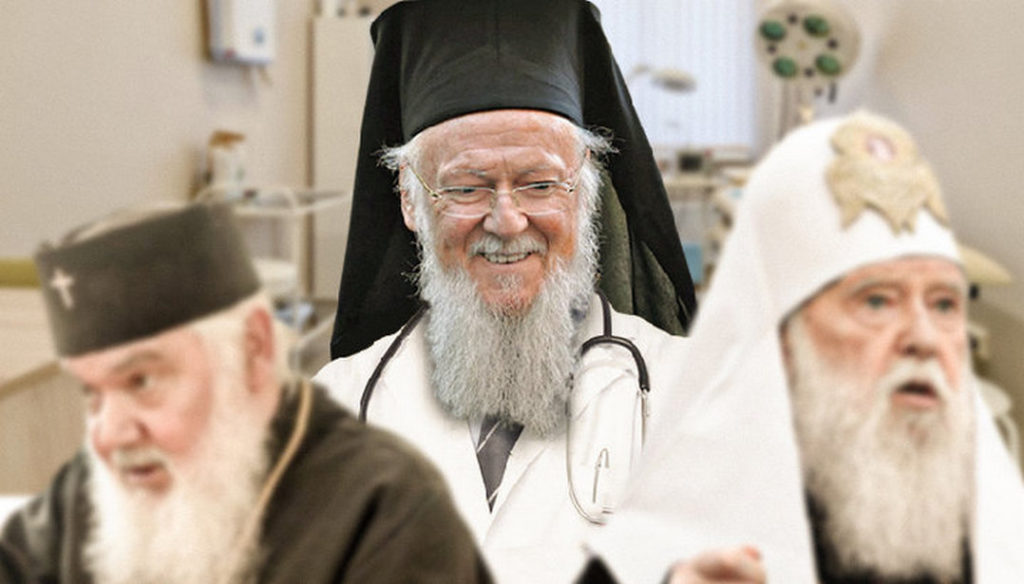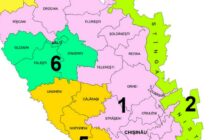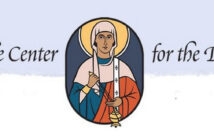Source: Union of Orthodox Journalists

Patriarch Bartholomew did not heal but legalized the schism in Ukraine. Photo: UOJ
In an attempt to justify its concelebration with the Ukrainian schismatics, Constantinople descends to a distortion of facts and a blatant lie.
The most inexplicable story in the history of the creation of the OCU for the Orthodox World was the question of how the Phanar was going to solve the obvious problem of the “hierarchs” of the UOC-KP and UAOC having no canonical ordinations. In the autumn and winter of 2018, when it became clear that the Patriarchate of Constantinople was determined to give autocephaly to the schismatic structures, there were various assumptions about how Patriarch Bartholomew was going to get around this obstacle. There were even suggestions that the Phanar hierarchs would explicitly or implicitly reordain the entire “episcopate” of the schismatics. However, no one could have imagined that Patriarch Bartholomew would simply ignore this issue and calmly declare laymen in cassocks bishops and priests.
The result of such arrogant behaviour of the Mother Church led to the fact that during the 9 months of the OCU’s existence, none of the Local Churches have recognized this structure, and many of them were skeptical about the absence of canonical ordinations among the members of the OCU.
This situation, which is not the most optimistic for Constantinople, resulted in a number of publications on pro-Phanar resources, in which the authors try to create a reality with “canonical” ordinations both in the UOC-KP and the UAOC. The task of such articles is understandable – to cast doubts in the Local Churches and prove the Phanar being right to legalize the Ukrainian schism.
Therefore, there is a need to once again put all the dots above the “i” and recall the necessary facts from the history of the “hierarchy” of the current OCU.
On the canonicity of “ordinations” made in schism
Judging by the decisions of Constantinople on Filaret and Makariy, the Phanariots believe that the ordinations made by the legitimate bishop who fell into schism are valid. Following this logic, the bishop’s falling into schism does not affect him or the Church at all. He himself does not lose the grace of the priesthood, he can perform the sacraments and ordain his followers as priests. Thus, the schism gets the opportunity for stable growth, and if the schismatic bishop manages to poach another bishop to his side, then together they can guarantee the long-term existence for the schism.
If all this is true, and even falling into schism does not affect the legitimacy and grace of the sacraments, then the Church has virtually no anti-schismatic arguments.
But in fact, the Church’s two-thousand-year-old position on this issue is clear and definite: schism is a sin that cannot be washed away even by martyrdom, and the “sacraments” of schismatics are blasphemy against the Holy Spirit, and they have no grace. We give specific quotes from the Holy Fathers not to be unfounded.
The Hieromartyr Ignatius the God-Bearer in an epistle to the Philadelphians writes: “Do not err, my brethren. If any man follows him that makes a schism in the Church, he shall not inherit the Kingdom of God.”
Blessed Augustine is sure that the schismatics are not in the Сhurch: “We believe in the Holy Church, [intending thereby]assuredly the Catholic. For both heretics and schismatics style their congregations “churches”. But heretics, in holding false opinions regarding God, do injury to the faith itself; while schismatics, on the other hand, in wicked separations break off from brotherly charity, although they may believe just what we believe. Wherefore neither do the heretics belong to the Church catholic, which loves God; nor do the schismatics form a part of the same.” (“On Faith and the Creed”)
The Church’s two-thousand-year-old position on this issue is clear and definite: schism is a sin that cannot be washed away even by martyrdom, and the “sacraments” of schismatics are blasphemy against the Holy Spirit.
St. Cyprian of Carthage has the same view: “If they don’t preserve unity and communion with the Church, no reformation of so great importance can be effected by them, as will compensate for the mischief arising from their schism. Even if people like this become martyrs for the name of Christ, their stain is not washed away. The unforgivable grievous sin of discord is not purged by suffering. You cannot be a martyr outside the Church. You cannot enter the kingdom when you shun those that will reign there.”
St. Irenaeus of Lyons echoes him: “Wherefore it is incumbent to obey the presbyters who are in the Church,-those who, as I have shown, possess the succession from the apostles; those who, together with the succession of the episcopate, have received the certain gift of truth, according to the good pleasure of the Father. But to hold in suspicion others who depart from the primitive succession, and assemble themselves together in any place whatsoever, either as heretics of perverse minds, or as schismatics puffed up and self-pleasing, or again as hypocrites, acting thus for the sake of lucre and vainglory. For all these have fallen from the truth.” (“Against Heresies”)
St. John Chrysostom compares heretics with schismatics and writes: “Causing divisions in the Church is no less an evil than to fall into heresies … the sin of schism is not washed away even by blood of martyrdom.” (Exegesis of the Epistle to Ephesians)
In one of the homilies, the same saint says: ”For if on the one hand those men have doctrines also contrary to ours, then on that account further it is not right to mix with them: if, on the other hand, they hold the same opinions, the reason for not mixing with them is greater still. And why so? Because then the disease is from lust of authority. Do you not know what was the fate of Korah, Dathan, and Abiram? (Numbers 16:1-35) Of them only did I say? Was it not also of them that were with them? What will you say? Shall it be said, Their faith is the same, they are Orthodox as well as we? If so, why then are they not with us? There is one Lord, one faith, one baptism. If their cause is right, then is ours wrong; if ours is right, then is theirs wrong. Children, says he, tossed to and fro, and carried about with every wind. Tell me, do you think this is enough, to say that they are orthodox? Is then the ordination of clergy past and done away? And what is the advantage of other things, if this be not strictly observed? For as we must need to contend for the faith; so must we for this also. For if it is lawful for anyone, according to the phrase of them of old, to fill his hands and to become a priest, let all approach to minister. In vain has this altar been raised, in vain the fullness of the Church, in vain the number of the priests. Let us take them away and destroy them.” (Homily 11 on Ephesians)
Hieromartyr Hilarion (Troitsky) in a letter to R. Gardiner says: “The Church is One, and She is the only place where one can receive the complete and unabridged plenteousness of the gifts of the Holy Spirit. Regardless of the person and the way that person secedes from the Church into a heresy or a schism or a self-proclaimed group, he forfeits the participation in God’s grace.”
St. Ignatius (Bryanchaninov) strongly believes: “A mortal sin that an Orthodox Christian hasn’t healed with proper repentance subjects the sinner to eternal torture… Mortal sins for a Christian are heresy, schism, blasphemy, apostasy… each of these sins mortifies one’s soul and makes it unfit for eternal bliss until it purifies itself with repentance.” (“On Death”)
Even these quotes are enough to understand that schism is spiritual death, which testifies to the person’s complete secession from the Church and, as a result, his loss of grace. To consider in this case the ordinations of schismatics lawful is not only a pernicious error but also a blasphemy against the Holy Spirit. Therefore, no matter how hard all kinds of hapless experts and theologians try, the fact is that the UAOC has never had the grace-filled priesthood and will hardly have one.
The Phanariots are well aware of it. But instead of admitting their epic mistake, they try to justify themselves and come up with the thesis that the grace of the priesthood, even after falling into schism, does not disappear. It turns out that the entire “hierarchy” of the UAOC, and especially of the UOC-KP, is valid, and all the bans and anathemas imposed on the main representatives of the Ukrainian schism have no force.
The absurdity of such theses is so obvious that there seems to be nothing to talk about. If it were not for one “but,” namely, posting on the unofficial website of the Patriarchate of Constantinople a “study”, which is fully devoted to this issue. Therefore, we are simply forced to remind the Phanariots of the rules and canons that the Church has followed for many centuries, as well as the position of the Patriarchate of Constantinople itself, which it adhered to until 2018.
On the “ordination” of Makariy Maletich
The Phanariots received into communion and reinstated Makariy Maletich to his “hierarchical or priestly rank”, that is in the rank of “metropolitan,” which he got, like the “Episcopal ordination”, inside the UAOC. To substantiate such a decision, pro-Phanariotic authors use an argument that seems completely absurd. According to this argument, “the ordinations, even made in schism but by the legal bishop, who in turn received the legal ordination and has apostolic succession, are real, and such clergy should be accepted into church communion in their dignity. It is important for them to have apostolic succession.”
On how the Church’s position on schismatic “ordinations” and schism, in general, is below. Here we give a quote from excellent research by Archpriest Rostislav Yarema, who studied the issue of the apostolic succession of Maletich’s “ordination”. According to the study, “of the three schismatic hierarchs who ‘ordained’ Makariy Maletich, one had ‘succession’ from the defrocked Filaret Denisenko, and the other two had no ordinations other than the ‘Chekalin’s’.”
Thus, Maletich’s “ordination” did not and could not have any, even distant, apostolic succession. Therefore, he could be accepted into the Church only on one condition – through repentance. Moreover, given his many years of schismatic activity, he could enter into communion with the Church as not even a priest, whom he used to be before going into schism, but at best a layman.
No canonical or theological arguments can be an obstacle to Constantinople when it comes to resolving their mercantile issues.
On the “apostolic succession” in the UOC-KP
According to the Phanariots, “There is no doubt about the apostolic succession of the episcopate of the former Kiev Patriarchate, because most of them were consecrated by the former Patriarch Filaret, who left the ROC together with the canonical bishop Jacob (Panchuk) of Pochaev. Moreover, according to Canon 1 of the Holy Apostles, episcopal ordination is considered valid if it is performed by at least two bishops. That is, Metropolitan Filaret and Bishop Jacob in the 90-s were enough to ordain and pass on apostolic succession.”
But, as we saw above, the fact that Filaret was in a schism already speaks of the complete failure of any sacred rites performed by him at that time. Moreover, the deposition of Filaret and later his excommunication (anathema) was recognized by all Local Orthodox Churches, including the Patriarchate of Constantinople.
And there are relevant conciliar documents about this.
In an August 26, 1992 letter, His All-Holiness Ecumenical Patriarch Bartholomew responded to Pat. Alexy II of Moscow and All Russia that he accepted the Moscow Patriarchate’s right to rule on this matter: “In response to the corresponding telegram and letter of Your greatly beloved and honorable Beatitude on the problem that has arisen in Your Holy Russian sister Church that led her Holy Synod, for reasons known to her, to the deposition of the until-recently leading member of her Synod, Metropolitan Filaret of Kiev, we desire to fraternally inform Your love, that our Holy Great Church of Christ, recognizing the fullness of the Russian Orthodox Church’s exclusive competence on this issue, synodally accepts the decisions regarding the one in question, not desiring to bring any trouble to Your Church. It is precisely in this spirit that we sent two brothers, His Eminence Metropolitan John of Pergamon and His Grace Bishop Vsevolod of Skopelos, after a visit to us by the one in question who has been deprived of his office, that we could be directly notified firsthand of what had occurred and avoid a misinterpretation in the given case…” (Prot. No. 1203)
The letter of His Holiness Patriarch Bartholomew to His Holiness Patriarch Alexy II dated April 7, 1997, on the anathematization of Filaret Denisenko states: “With the appropriate attention, in the meeting of the Holy Synod which sits with us, we read the letter of March 6th of this year (protocol n. 749), from Your most beloved Beatitude, communicating to our most Holy Church the canonical decision of your Holy Synod imposing the sanction of anathema on Filaret (Mikhail Denisenko) and Gleb Yakunin, and the dismissal from the priestly order and reduction to the secular state of Valentin Rusantsov, Adrian Starina, and Ioasaf Shibaev.
Having received the notice about this decision, we have informed the hierarchy of our Ecumenical See about it and asked them henceforth to have no church communion with the aforementioned persons.” (Prot. No. 282)
The Holy Synod of the Russian Orthodox Church deposed Filaret (Denisenko) on June 11, 1992. The deposed Filaret resorted to an appeal procedure, for which he immediately personally visited Phanar. In response to the appeal, Patriarch Bartholomew sent to Moscow his representatives – His Eminence Metropolitan John of Pergamon and His Grace Bishop Vsevolod of Skopelos, a Ukrainian by birth, so that they, as the letter to Patriarch Alexy says, “could be directly notified firsthand of what had occurred and avoid a misinterpretation in the given case”.
The Phanar’s decision on the appeal of Filaret was negative, with a clear statement that “our Holy Great Church of Christ, recognizing the fullness of the Russian Orthodox Church’s exclusive competence on this issue, synodally accepts the decisions regarding the one in question, not desiring to bring any trouble to Your Church” (Letter dated 1992).
The Patriarchate of Constantinople reacted to the deposition of Filaret with due seriousness, corresponding to the significance of the issue, and with lightning speed, in order to prevent delays detrimental to all parties, and, most importantly, with absolute consistency with respect to its centuries-old traditions, recognized the deposition. Moreover, 76 days later (11.06.1992: deposition – 26.08.1992: patriarchal and Synodal decision to reject the appeal and recognize the deposition), the Phanar from the canonical point of view “closed the case”.
However, Filaret didn’t care of either his deposition in Moscow or the rejection of the appeal by the Patriarchate of Constantinople, or the recognition of the verdict by all Orthodox Churches. He continued to commit serious church crimes, provoking schism and unrest among the people: being deposed, he made dozens of ordinations, created a schismatic Synod, named himself a patriarch, communed with schismatics of other Churches, flooded Ukraine with his altars, etc.
In this regard, the decision against him of the Moscow Patriarchate of 1992 was no longer subject to appeal in accordance with Canon 4 of the Council of Antioch, Apostolic Canon 22, Canon 37 of the Council of Carthage (Pedalion) due to Filaret’s decade-long anti-canonical and provocative behaviour.
Filaret didn’t care of either his deposition in Moscow or the rejection of the appeal by the Patriarchate of Constantinople, or the recognition of the verdict by all Orthodox Churches. He continued to commit serious church crimes, provoking schism and unrest among the people.
The pan-Orthodox ecclesiastic consciousness (including the Patriarchate of Constantinople until 2018) has recognized that the Russian Orthodox Church absolutely legally deposed and then anathematized Filaret Denisenko. This means that all the “ordinations” made first by the schismatic and then by the anathematized person named Mikhail Denisenko have no canonical force and are not consecrated.
The Phanar supported this situation until 2018, examined the Denisenko case in great detail, sent a commission, studied the materials and made a decision only after a thorough analysis of all the parties’ arguments. To say after that that the anathema was imposed on Filaret not for dogmatic reasons is not only to contradict oneself but to tell a sheer lie.
* * *
All the attempts of the Phanar to somehow justify its concelebration with the schismatics from the OCU do not stand up to the slightest criticism. Neither from the point of view of the canons of the Church nor from the point of view of the Holy Fathers nor from the point of view of historical justice – it is simply impossible to receive Ukrainian schismatics into the Church without their repentance and in the existing status.
None of the schismatic groups in Ukraine has had the grace of the Holy Spirit. This means that they cannot perform such sacred rites as Baptism, Chrismation, the Eucharist and Priesthood, etc.
The Patriarchate of Constantinople, by its decision on the “legalization” of members of schismatic Ukrainian groups, makes a very dangerous precedent. Indeed, in the history of Orthodoxy, there have been many schisms and anathemas. It turns out that at any moment any anathema can be lifted as “political”, and the schism and the accompanying “hierarchy” are declared canonical. What is this if not the path to canonical anarchy? Therefore, the actions of Constantinople are, in fact, a canonical crime for which the Patriarch Bartholomew and the entire Synod of the Phanar should be held responsible for.
And another very important point. In the actions of the modern Church of Constantinople, political expediency rather than a concern for canonical norms is becoming increasingly evident. In other words, what benefits the Phanar is declared lawful, and what doesn’t benefit is unlawful.
A very recent example is the conflict around the Archdiocese of Western European parishes, where on September 7, 2019, the clergy and laity intend to hold a general meeting to determine its future fate (one of the points of the meeting is the withdrawal from the jurisdiction of the Patriarchate of Constantinople). Patriarch Bartholomew declared the meeting unauthorized, and regarding the Orthodox who were ready to fight for the canonical autonomy of their structure, he remarked: “We will declare them outside the Church.”
But on what ground? If Filaret, according to the Phanar’s logic, is a canonical bishop, why should then the Archdiocese, acting in accordance with its statute, be outside the Church? The Phanar will simply have to recognize all the sacraments that will be performed by representatives of the Archdiocese, otherwise, it will have to smother its own voice.
However, they have already done this for a long time, and one more time will not change anything – from the Ecumenical capital of the Orthodox world, the Patriarchate of Constantinople is gradually turning into an insignificant spot on the map of Istanbul, which is almost destroyed by pride, thirst for power and the ambitions of several people. And believers of the whole world are forced to watch with pain and bitterness these people consistently destroying the unity of Orthodoxy.



